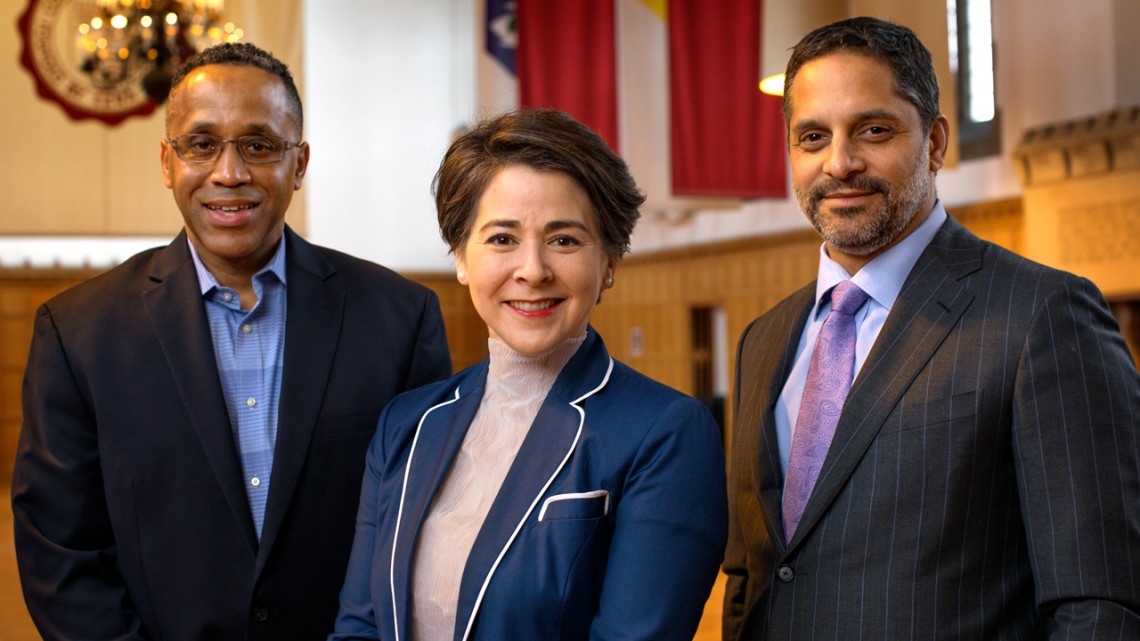
From left, Presidential Task Force on Campus Climate Co-chairs David Wooten, Lisa Nishii and Eduardo Peñalver.
Presidential Task Force on Campus Climate to survey Ithaca campus
By Joe Wilensky
Members of the Presidential Task Force on Campus Climate are actively working toward an end-of-semester deadline to deliver specific recommendations to President Martha E. Pollack. And as the task force continues its work, progress on diversity and inclusion efforts is ongoing across campus.
As part of the task force subcommittees’ work, a survey will be emailed to all members of the Ithaca campus the week of March 19 to engage the community on a range of campus climate issues.
The task force is composed of faculty, staff and students and is divided into three subcommittees: Campus Experience, led by Lisa Nishii, associate professor of human resource studies and vice provost for undergraduate education; Regulation of Speech and Harassment, led by Eduardo Peñalver ’94, the Allan R. Tessler Dean and professor of law, who took over as co-chair from University Counsel Madelyn Wessel in January; and Campus Response, led by David Wooten, professor of marketing in the Dyson School and associate dean and chief diversity officer of the Cornell SC Johnson College of Business.
“Over the course of the semester, the subcommittees have met with numerous individuals and administrators in an effort to better understand Cornell’s policies, resources and climate challenges,” Wooten said. “From those meetings, we have developed a survey that will allow us to better understand the community’s experiences on campus and inform our final recommendations.”
The survey will be conducted by Cornell’s Survey Research Institute. Responses will be kept anonymous. All members of the university community are encouraged to complete the survey and be engaged in the process, Wooten said.
Nishii said: “We will continue to reach out to a wide range of faculty, staff and student groups throughout the semester, as some of the issues of interest are better explored in person. We will also solicit feedback on targeted items on the task force website.”
In a statement released March 10 following an assault in Collegetown in which racial slurs reportedly were used, Pollack and Vice President for Student and Campus Life Ryan Lombardi urged the use of support services and reiterated that they look forward to the upcoming recommendations of the task force. University leaders “will not simply brush this episode aside,” they said, “nor will we let it deter us as we continue to strive for a more just, equitable and inclusive campus.”
Diversity and inclusion progress continues
In her Sept. 17 statement announcing the task force would be formed, Pollack requested steps also be taken to “develop and/or enhance programs and services that support diversity and inclusion” and “create and implement an alternative dispute resolution process based on restorative justice.”
“There’s been a significant investment of resources into these areas,” said Dean of Students Vijay Pendakur, “due to the level of care and attention to diversity and inclusion issues from Ryan Lombardi, [Provost] Mike Kotlikoff and Martha Pollack, along with support from our board of trustees.”
Pendakur detailed several examples of new hires, new initiatives and other progress happening on campus. These, and numerous other examples, can be found on the university’s Diversity and Inclusion Campus Climate Initiatives website.
In the dean of students office, two positions are being added – a director for first-generation and low-income support services (FGLI), and a new associate dean for alternative dispute resolution (ADR).
The FGLI position, sponsored by the president’s office and funded through an external donor, will help advocate for first-generation and low-income students, as well as develop programs and initiatives that empower these students on their pathway to graduation, Pendakur said.
The ADR associate dean will help create and implement a new alternative dispute resolution process based on restorative justice that can be a resource for students involved in incidents of interpersonal bias that do not rise to the level of a Campus Code of Conduct violation, Pendakur said. This new model “will allow us to actually be much more nuanced and nimble in dealing with campus climate incidents,” he said. “[This is] a process that does not have the onus of a judicial sanction attached to it, but actually has the possibility of healing, restoration and new understanding.”
Another new position, funded through the provost’s office, is an assistant director for undocumented student and DACA student support. Kevin Graham began the job in January. Similar to the philosophy of the FGLI position, Pendakur said, Graham “is able to shift the burden of advocacy off the students themselves and … be able to advocate for them and help them navigate Cornell so they can focus on student success and graduation.”
Another effort is a partnership between Student and Campus Life and the university’s Intergroup Dialogue Project, which works with Cornell students to develop dialogue about and across identity differences through courses and workshops. Pendakur said Cornell leaders are working to develop a way to have all byline-funded student organization leaders, including all Greek organization leaders, to go through IDP training before they can begin their leadership positions.
At Cornell Health, five mental health clinicians were hired in Counseling and Psychological Services (CAPS) last fall, growing that staff by two – and four out of those five hires bring diversity in representing underserved minority populations to their work at Cornell. Demand for CAPS services is expected to continue to grow, according to Dr. Kent Bullis, executive director of Cornell Health. An additional two therapy staff positions in CAPS are being added, he said, with recruitment efforts beginning immediately and with the goal of having the positions filled by the beginning of the fall semester.
Media Contact
Get Cornell news delivered right to your inbox.
Subscribe

